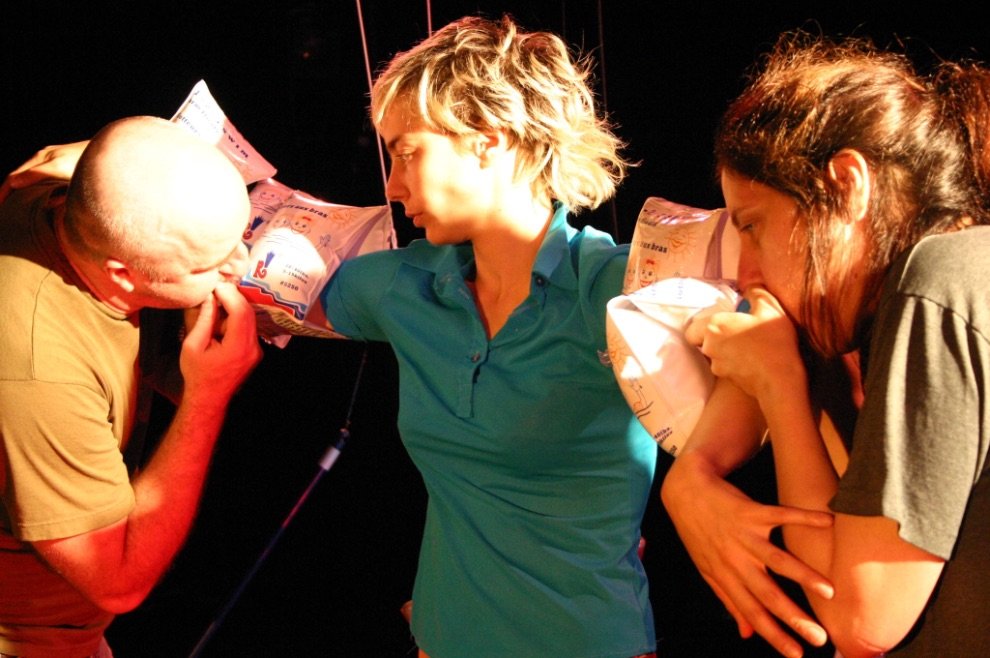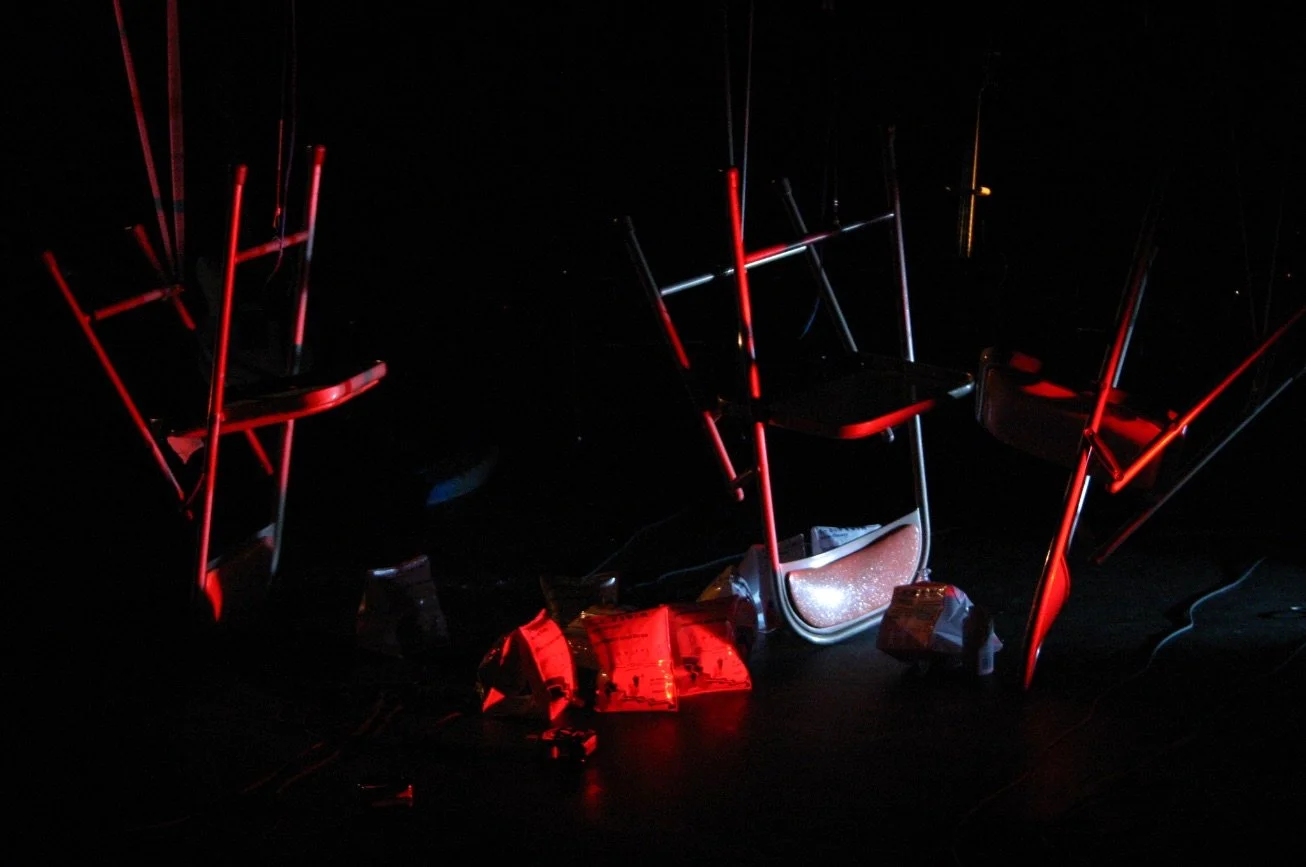Families Are Formed Through Copulation
2005

Gaétan Nadeau, Laure Ottmann, and Tracy Wright in Families Are Formed Through Copulation at Usine C in Montreal (2005). Photo: Mathieu Chartrand

Laure Ottmann, Gaétan Nadeau, and Tracy Wright in Families Are Formed Through Copulation at Usine C in Montreal (2005). Photo: Mathieu Chartrand

Gaétan Nadeau, Tracy Wright and Laure Ottmann in Families Are Formed Through Copulation at Usine C in Montreal (2005). Photo: Mathieu Chartrand

Jean-Pierre Gauthier’s installation from Families Are Formed Through Copulation at Usine C in Montreal (2005). Photo: Mathieu Chartrand

Tracy Wright and Laure Ottmann in Families Are Formed Through Copulation at Usine C in Montreal (2005). Photo: Mathieu Chartrand
Families Are Formed Through Copulation focuses on the family and how it relates to our contemporary world. With a cast of three performers representing the traditional family (Mother, Father and Daughter), the production uses the fact that everyone in the audience has a family and can relate to the production’s thematic territory as a theatrical fulcrum upon which to destabilize our unexamined and generalized assumptions regarding modern family life, never losing sight of the fact that our feelings towards our own families are some of the most personal and intense emotions we are capable of experiencing.
There is a joke that is sometimes made about the PME show Families Are Formed Through Copulation. The joke is that Families Are Formed Through Copulation is a show designed to convince the audience not to have children or if they already have children simply not to have any more.
Why should they not have children? Well, first they should honestly try to assess just exactly how they feel about their own parents. If this proves insufficient, perhaps they might also contemplate the fact that the world we live in isn’t particularly fit to bring a child into. Keep in mind this is only a joke. We are well aware that we will essentially convince no one. That people will continue to have children regardless.
The production focuses on a distorted family situation that can certainly be read as that of a single family but just as easily can be seen as the multiple, overlapping experiences of many different families, perhaps even all families. This narrative ambiguity parallels the thematic moral ambiguity of the extreme situations within the show itself as well as the deeply complex, ambiguous feelings one often experiences as a member of a nuclear family. If the nuclear family forms the basis for much of the world in which we currently live, this show dissects it with a performative scalpel.
This piece corresponds to Part One of the novel Families are Formed Through Copulation (Pedlar Press, 2007) and La famille se crée en copulant (Le Quartanier, 2008).
Written and directed by Jacob Wren. Created and performed by Gaétan Nadeau, Laure Ottmann, and Tracy Wright. Translation by Eva Labarias (in French), Nikolai Francke (in German), and Tomoyuki Arai (in Japanese). Visual art installation by Jean-Pierre Gauthier. Choreography by Martin Bélanger. Technical direction: Mathieu Chartrand. Stage managers: Keri Strobl and Isabelle Beaudry.
A co-production with Forum Freies Theater (Düsseldorf). Residency: Usine C (Montréal). With the support of the Canada Council for the Arts, the Department of Foreign Affairs and International Trade of Canada, the Conseil des arts et des lettres du Québec, and the Kunststiftung NRW (Arts Foundation of North Rhine-Westphalia, Germany).
Montréal, Usine C • Brussels, Kaaitheater • Düsseldorf, Forum Freies Theater • Bergen, BIT Teatergarasjen • Tokyo, Post-Mainstream Performing Arts Festival • Maubeuge, Le Manège/Via Festival • Dresden, Projekttheater • Créteil, Maison des Arts/Exit Festival • Prague, Divadlo Archa • Cardiff, Chapter Arts Centre
With Families Are Formed Through Copulation, PME has the merit to oblige the public to ask themselves some questions before moving onto the act [of having children]. [The demonstration] more or less begins with a succession of nihilistic subjects that point out the brutality of the world and the complexity of the family’s relationships to us, then culminates in the third part with a reading (by a digital voice) of a comical manifesto, full of makeshift subjective arguments. But since they are such devil's advocates, these artists could not leave the public on such a categorical and straightforward note. One thus concludes the performance with a deliciously discordant reconciliation [...] Deadpan humour, a casual style of acting, surprising musical choices, nonchalant choreographies (by Martin Bélanger), shattered scenic space. If the form is appreciably the same from one production to another, the content is constantly renewed. The theatre of PME plunges us into the heart of our contradictions. It supports the cohabitation of rational and of irrational […] flushes out our ambiguities and reverses the generally accepted ideas.
– Ève Dumas, La Presse, Montréal
[…] the acting on display, apparently relaxed, even disinvested, constitutes the strongest and most captivating aspect of this performance [...] the type of movement privileged by Wren breaks with the religion of “the economy of the gesture”. And what a happiness! What a pleasure to see all these small parasitic movements, these furtive explosions of spontaneity (real or simulated), these awkward meetings of bodies and glances. Through the paradox of a constructed casualness, performed, the acting acquires a metaphorical value and thus reveals a truth... Therefore, this type of play can astonish, even destabilize, and it is refreshing to see that from one piece to another, the productions of PME manage to shake the tyranny, nowadays unanimous, of the precisely and conspicuously choreographed gesture. [...] certain images, certain textual fragments - bitter, scathing, sometimes ambiguous – echo with the astonishing new stage object conceived by Jacob Wren and his accomplices. PME or the undeniable charm of casualness. It is only a little later, during a conversation or while letting one’s thoughts drift over the fragility of human relations, that these images will surface again, suddenly, forcefully discharging their ironic and (more rarely) poetic load […]
– Catherine Cyr, Jeu, Montréal
[…] a major figure on the Canadian scene, Jacob Wren pulverizes with a scalpel the relations between parents and children caught in the large contemporary boiler. Families Are Formed Through Copulation mixes disturbing confessions, scathing therapy and ambiguous reflections, in a casual style of murderous effectiveness […]
– Gwénola David, La Terrasse, Paris
